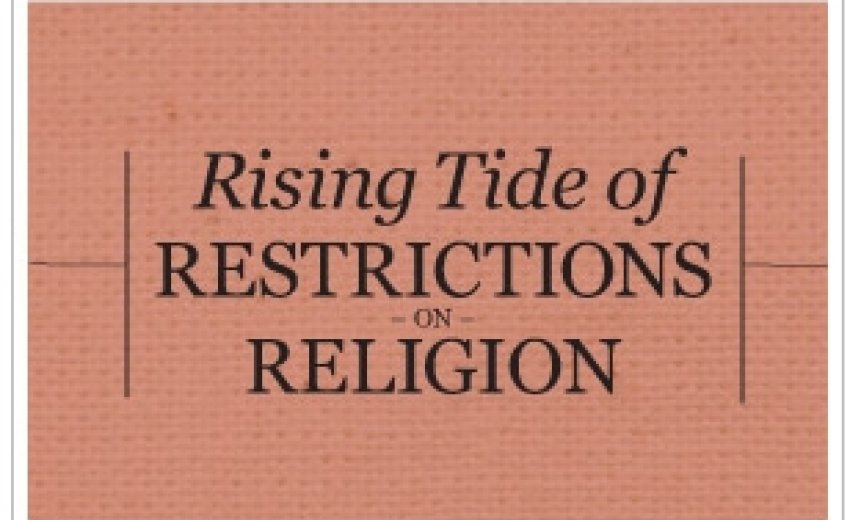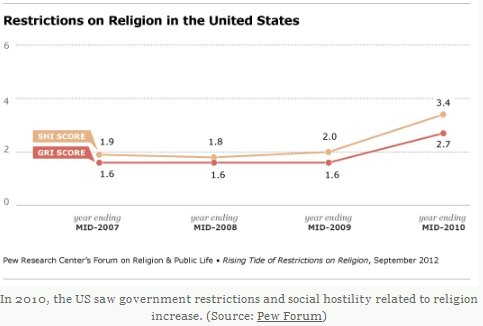Released this week, the Pew Forum on Religion and Public Life’s 2010 update of its Rising Tide of Restrictions on Religion report ranks religious restrictions and “social hostility” involving religion among countries around the globe:
Among the world’s 25 most populous countries, Egypt, Indonesia, Russia, Burma (Myanmar), Iran, Vietnam, Pakistan, India, Bangladesh and Nigeria stand out as having the most restrictions on religion as of mid-2010 when government restrictions and social hostilities both are taken into account. Brazil, Japan, Italy, the United States and the Democratic Republic of the Congo have the least restrictions and hostilities.
Covering developments around the world through mid-2010, the report provides an interesting note:
The United States was among the 16 countries whose scores on both the Government Restrictions Index and the Social Hostilities Index increased by one point or more in the year ending in mid-2010.1 This was the first time scores for the U.S. increased on both indexes during the four-year period covered in this study.
While United States ranks relatively low on government restrictions and social hostility, for the first time it has seen a significant increase on both indices, and the issues behind this relate directly to the Sikh American experience.
Regarding the increase in the government restrictions index:
During the period from mid-2009 to mid-2010, a number of the sources used in the study reported an increase in the number of incidents at the state and local level in which members of some religious groups faced restrictions on their ability to practice their faith. This included incidents in which individuals were prevented from wearing certain religious attire or symbols, including beards, in some judicial settings or in prisons, penitentiaries or other correctional facilities. For instance, the U.S. Department of Justice reported that it was pursuing a lawsuit in federal court against the California Department of Corrections and Rehabilitation and various California officials on behalf of a Sikh prison inmate who, in March 2010, had been ordered to trim his facial hair in violation of his religious beliefs. The Justice Department said the state’s inmate grooming policy “imposed a substantial burden” on the man’s ability to exercise his faith.2
This latter example is that of Trilochan Singh Oberoi, and was part of the impetus behind the signing of California’s Workplace Religious Freedom Act only a few weeks ago.
The study also discusses the increase in social hostility involving religion in the United States, citing the examples of alleged Islamic related terrorist attacks (or attempted attacks) from mid-2009 through mid-2010, while on the flip side, also noting the increase in opposition to the construction of mosques in various parts of the country. One of the inputs to the US social hostility score is the FBI Hate Crimes statistics, which (as now often mentioned) does not appropriately report anti-Sikh crimes and understates the level of hate crimes in the United States.
Religious discrimination in the workplace also increased in the time period covered in the report:
The increase in social hostilities in the U.S. also reflects a rise in the number of reported religion-related workplace discrimination complaints. The number of such complaints filed with the U.S. Equal Employment Opportunity Commission (EEOC) rose from 3,386 in the fiscal year ending on Sept. 30, 2009, to 3,790 in the year ending on Sept. 30, 2010.14 The number of cases that the EEOC determined had “reasonable cause” rose from 136 to 314 during this period.
We will have to wait to see in subsequent reports what this year’s events — such as the shootings of Sikhs in Oak Creek, Wisconsin, the passing of workplace religious freedom laws in the city of New York and the State of California, and the increased negative attention placed on other religious minorities (such as American Muslims) — will have upon the trend in the United States.

